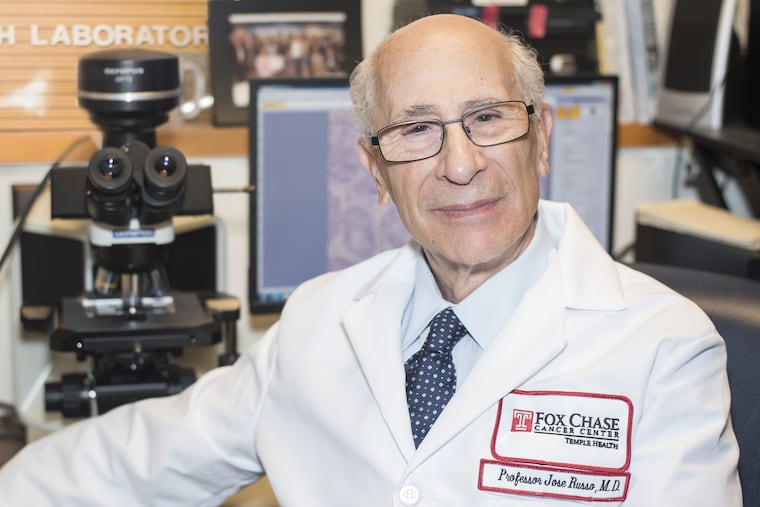Jose Russo, physician and scientist acclaimed for his work on breast cancer research, dies at 79
Dr. Russo spent decades studying how various synthetic chemicals may increase the risk of breast cancer and why the risk is reduced in women who have babies in early adulthood.

Jose Russo, 79, a Fox Chase Cancer Center physician and scientist who was acclaimed for his research on reducing the risk of breast cancer, died Friday, Sept. 24, at home in Rydal.
Dr. Russo worked until a week before his death, when he became too weak from his own bout with cancer of the stomach, said his daughter, Patricia A. Russo.
Dr. Russo spent decades studying how various synthetic chemicals may increase the risk of breast cancer and why the risk is reduced in women who have babies in early adulthood.
In 2019, he and an international team of colleagues announced they had discovered the key molecular signature behind that protective effect of pregnancy, and they began to study ways to mimic it with drugs. In May, they reported they had induced these molecular changes in high-risk women by administering a synthetic version of a pregnancy hormone — a first step toward developing a preventive medication.
He worked for years on these challenges alongside his wife, scientist Irma Russo, for whom their Fox Chase lab was renamed after she died in 2013. He continued the work with his second wife, Magda Johanna Vandeloo, after she joined the lab in 2018.
His daughter, a physician like her father, said he was guided by his Catholic faith as well as the power of the scientific method, and he did not see the two worlds as being in conflict.
“He really saw how they integrated in terms of finding this eternal truth,” she said.
A native of a small town in Argentina, Dr. Russo described in a 2019 memoir how he became interested in science and medicine as a young boy, concerned by his mother’s lingering weakness after she survived tuberculosis. He pretended to treat his sister’s dolls, making “imaginary incisions” and applying ointments, he recalled.
In second grade, he and a friend collected frogs and insects for study, and converted an empty henhouse into their laboratory, furnishing it with a chemistry set that Dr. Russo’s father ordered from the United States.
He earned his medical degree in 1967 from the National University of Cuyo in Mendoza, Argentina, where he met his first wife, followed by a fellowship with a national research agency. After the couple were married, they moved to the United States in 1971 on a fellowship from the New York-based Rockefeller Foundation, and later moved to the Michigan Cancer Foundation in Detroit.
While in Michigan, Dr. Russo helped develop cultures of breast cancer cells that remain widely used by researchers to this day, said Jonathan Chernoff, senior vice president and chief scientific officer at Fox Chase.
The couple moved their lab to the Philadelphia cancer institute in 1991. Dr. Russo was passionate about communicating his work to others, training dozens of graduate students and more than 150 undergraduates who came through Drexel University’s co-op program. He once helped run a daylong program in which breast cancer survivors learned laboratory techniques.
“He was a gentleman scientist,” Chernoff said. “Very public service-minded.”
Dr. Russo was a talented photographer and recently taught himself to paint, completing more than 300 portraits and other works, his daughter said.
In addition to his wife and daughter, he is survived by stepsons Peter and Erik Maurissen and several other relatives.
A funeral was held Oct. 1. Condolences may be sent to the Russo Family, P.O. Box 727, Foxcroft Square, Jenkintown, Pa. 19046.